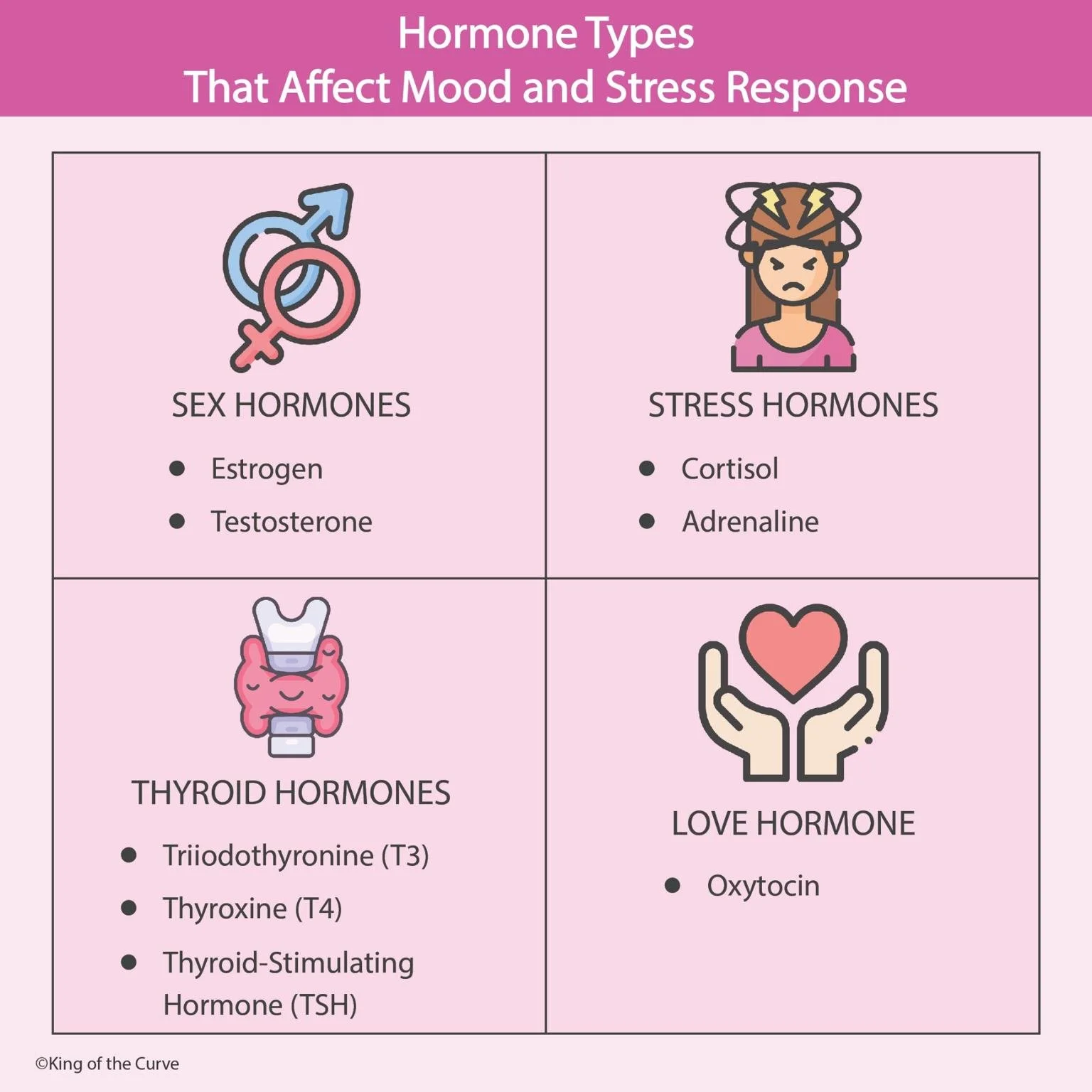💡 Hormone Types That Affect Mood and Stress Response
Hormones are the body’s chemical messengers — powerful molecules that influence how we feel, think, and react to stress. Understanding their role helps explain why our mood can fluctuate or why stress sometimes feels overwhelming. This blog breaks down the key hormone types that affect both mood and stress regulation — knowledge that’s not just useful for everyday wellness, but also for exam prep in physiology-heavy tests like the MCAT and NCLEX.
🧠 Sex Hormones: The Mood Shapers
Estrogen and testosterone are key players in emotional regulation, motivation, and energy levels.
Estrogen helps stabilize mood by increasing serotonin levels and improving emotional resilience.
Testosterone influences confidence, motivation, and even aggression — a fine balance that affects both mood and focus.
📘 Exam Connection: On the MCAT, sex hormones often appear in questions about endocrine feedback loops or reproductive physiology. Know how fluctuations in these hormones can alter emotional and behavioral responses.
⚡ Stress Hormones: The Body’s Alarm System
When stress hits, your body activates the fight-or-flight response through hormones like cortisol and adrenaline.
Cortisol increases blood sugar and suppresses nonessential functions (like digestion or immunity).
Adrenaline heightens alertness and energy, preparing you to act fast.
🧩 Clinical Relevance: Chronic elevation of cortisol can lead to fatigue, anxiety, and immune suppression, concepts tested in MCAT behavioral science and NCLEX stress physiology questions.
🔥 Thyroid Hormones: The Metabolic Regulators
The thyroid gland produces T3 (triiodothyronine), T4 (thyroxine), and TSH (thyroid-stimulating hormone) — all of which play vital roles in metabolism and mood regulation.
Low thyroid hormone levels (hypothyroidism) can cause fatigue, depression, and slowed thinking.
High levels (hyperthyroidism) may lead to anxiety, irritability, and restlessness.
📈 Exam Tip: Understand the negative feedback loop between the hypothalamus, pituitary gland, and thyroid — it’s a classic MCAT topic.
💖 The Love Hormone: Oxytocin
Known as the “love hormone,” oxytocin is released during bonding, social interaction, and physical touch.
It fosters trust, empathy, and connection — essential for human relationships. It also helps reduce stress by dampening the effects of cortisol.
🧠 Exam Insight: Oxytocin often comes up in psychology and sociology passages — especially in discussions of attachment theory and emotional regulation.
📊 Summary Table
| Hormone Type | Key Hormones | Function | Exam Connection |
|---|---|---|---|
| Sex Hormones | Estrogen Testosterone | Mood stability, motivation | Endocrine system feedback |
| Stress Hormones | Cortisol Adrenaline | Fight-or-flight response | Stress physiology |
| Thyroid Hormones | T3 T4 TSH | Metabolism, mood regulation | Negative feedback control |
| Love Hormone | Oxytocin | Emotional bonding, trust | Psychology / Sociology |
🩺 Why This Matters for Future Clinicians
Understanding how hormones influence mood and stress is essential not just for acing exams, but for practicing compassionate medicine. Whether managing anxiety, hormonal imbalance, or burnout, clinicians must recognize how internal chemistry shapes emotional health.
📲 Explore More Visuals:
See this and hundreds of other KOTC illustrations at mcat.kingofthecurve.org — your visual library for mastering science the smarter way.
🧭 Call to Action
Join over 100,000 pre-med and nursing students using King of the Curve for adaptive learning that makes science simple, visual, and unforgettable.
Start learning with KOTC’s Adaptive Q-Bank, Curve Coins, and Daily Question Challenges at kingofthecurve.org.
Frequently Asked Questions (FAQs)
-
Aim for 4-6 focused hours, ensuring you incorporate breaks to avoid burnout.
-
Practice mindfulness techniques, take practice exams under realistic conditions, and maintain a balanced lifestyle.
-
Set short-term goals, seek support from mentors, and reward yourself for small achievements.
-
Regular exercise improves focus, reduces stress, and enhances overall mental clarity.
-
KOTC offers personalized learning tools, gamification features, and adaptive question banks to help students stay on track without burnout.


